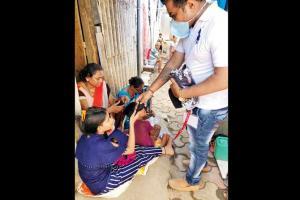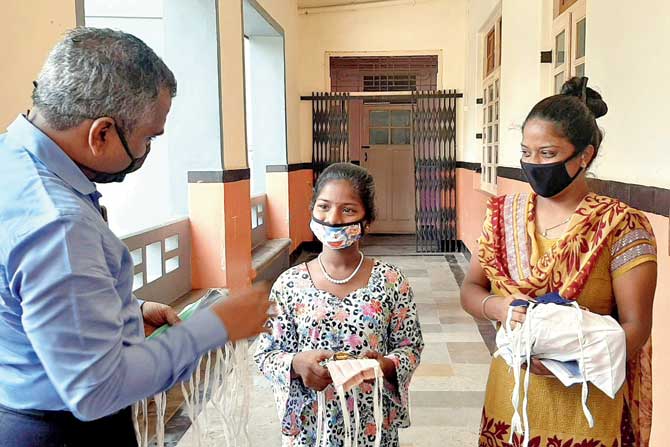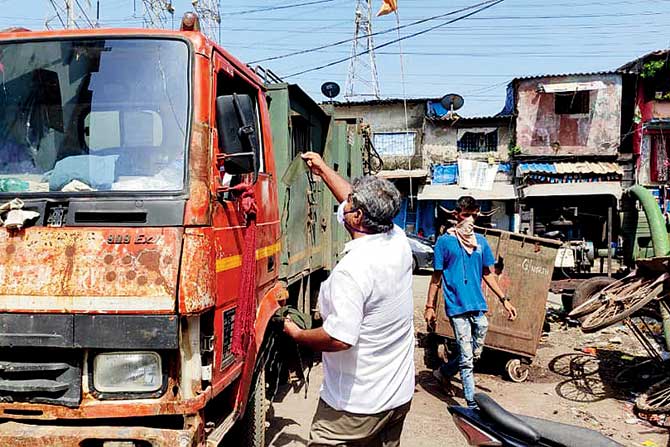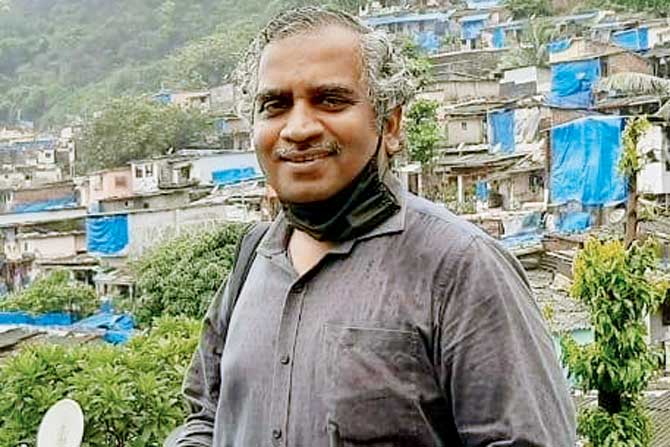sixty teachers who were downsized due to the lockdown are helping small groups of homemakers from across the city to stitch masks

Masks being distributed to people in slum areas
For the many teachers and mostly women who were rendered jobless by the changes brought on by the pandemic, Dr Narayan Iyer of an NGO emerged as a saviour, giving them a new source of income by making masks. These teachers have roped in several housewives struggling to feed their families in different slum pockets of the city.
ADVERTISEMENT
THROUGH the 60 teachers, whom Dr Iyer, the CEO of the India Development Foundation (IDF) — the NGO behind the project, has helped about 300 people, including migrant workers and daily-wage earners, across Dharavi, Malwani, Bharat Nagar, BKC and Goregaon, become financially independent.
Earn Rs 500 a day

Dr Narayan Iyer, whose NGO started the initiative to help women in distress
Under an initiative, the women have been trained to make face masks according to the standards given by the World Health Organisation. Each person stitches, sanitises and packages 100 masks a day and makes Rs 500, earning Rs 5 per mask. And these masks are then distributed in the slums, to auto drivers, homeless and the civic staff working tirelessly to keep the city up and running during the lockdown. And they procured the materials for free through their network.
A family of 14 with no jobs
"I was a teacher at a BMC-run Urdu medium school in Mitha Nagar, Goregaon West. I was teaching the Std I and II students on a temporary basis and earned Rs 10,000 a month. But due to the lockdown, the school never reopened and I lost my job," said Muskaan Ansari, 33, a resident of Bharat Nagar, BKC.
Muskaan said, "All of the four members of our family lost their jobs during the lockdown and the monthly income of around Rs 60,000 in our house stopped suddenly, and feeding 14 mouths became a challenge." "A few weeks ago, my sir from the previous school approached me to ask if I could make masks. I said yes even though I had no experience in stitching. I called up a distant relative whose garment outlet in Bharat Nagar was closed due to the lockdown and made arrangements to rent sewing machines for Rs 3,000 a month," said Muskaan.
Employed 15 more women
Within a few days, Muskaan managed to employ 15 more women in Bharat Nagar, including eight temporary teachers like her.
Vijay Basak, 32, a social activist from Dharavi, said that it is unfortunate that many teachers lost their jobs as schools went online amid the pandemic. "We gave work making masks to teachers and other housewives in Dharavi and Thakkar Bapa colony in Kurla East. And they are now earning at least Rs 6,000 to Rs 7,000. I hope IDF is able to get more contracts, so that we can continue to have a source of income," said Basak.
Udaya Kumari, a resident of Malwani in Malad, earned Rs 20,000 monthly tutoring students at home. Udayakumari, 50, a widow, took home tuitions after losing her job at a private school in Malad. Her daughter, too, took home tuitions.

Dr Narayan Iyer distributes masks at schools and to civic staff
"I was happy that I could easily make around 100-plus face masks. The raw materials and cut pieces of mask would be delivered at my doorstep. My job was to just stitch the masks that were then picked up. I was able to make around Rs 6,000-Rs 7,000, which was good enough for me and my daughter. But we don't have any other source of income today," she said.
Salary slashed to Rs 50 a day
Vandana Jha, 34, a resident of Babrekar Nagar in Malad West, teaches Hindi language to Std IX and X at a private school. She earned Rs 100 per class before the lockdown, but now it has been slashed to Rs 50 when she takes online classes.
"It is very difficult to meet daily expenses at R50 a day. And, now that I take online classes, my mobile recharge cost has gone up to Rs 400 a month. When I learnt about an opportunity to make face masks, I decided to take
up the additional work as I can stitch. On an average, I make around 50-60 masks," she said. "My husband is an auto driver, but during the lockdown he had no income. Two months back, my mother-in-law fractured her hand and he had to go to his hometown Patna, Uttar Pradesh. I am taking care of my two children and also running the house here," Jha said.
It's Project SHAAN

Dr Narayan Iyer, IDF CEO
Dr Iyer said this initiative, named Project SHAAN, was by the IDF during the lockdown to provide sustainable income to women who have lost their jobs. "The three-layered fabric reusable masks are made by the poor for the poor. They are distributed in slums pockets, hospitals, police stations, schools, bus stations and railway points in Mumbai, tribal belt and neighbouring districts."
Through Project SHAAN, the IDF created self-help groups in different locations like Dharavi, Bharat Nagar, Prem Nagar, Malwani and Ambudwadi, and provided sustainable job opportunities. This has helped women take care of their electricity bills and tuition fees of their children.
Dr Iyer said he could employ so many people because, "Initially he got the order from various trusts and charitable institutions with lump sum demand for face masks for public distribution, and they would donate the equivalent money. So far we have distributed 50,000 masks made by people in Dharavi, Goregaon and Malwan, Malad.
Currently, 20,000 masks are being made at Bharat Nagar by Muskaan and her team. We are expecting another order for 25,000 masks which will be given to women in Malwani and Dharavi."
How it started
Speaking about what inspired him to come up with this initiative, he said, "Initially, during the lockdown, I along with my volunteers would go to the slum pockets to distribute cooked meals and dry ration. During these visits, the housewives and some teachers told us about the challenge they were facing in paying the bills and buying basic groceries, as they had no cash because they had lost their jobs." "That is when we realised people need more than ration and meals, and came up with SHAAN."
Keep scrolling to read more news
Catch up on all the latest Mumbai news, crime news, current affairs, and a complete guide from food to things to do and events across Mumbai. Also download the new mid-day Android and iOS apps to get latest updates.
Mid-Day is now on Telegram. Click here to join our channel (@middayinfomedialtd) and stay updated with the latest news
 Subscribe today by clicking the link and stay updated with the latest news!" Click here!
Subscribe today by clicking the link and stay updated with the latest news!" Click here!







